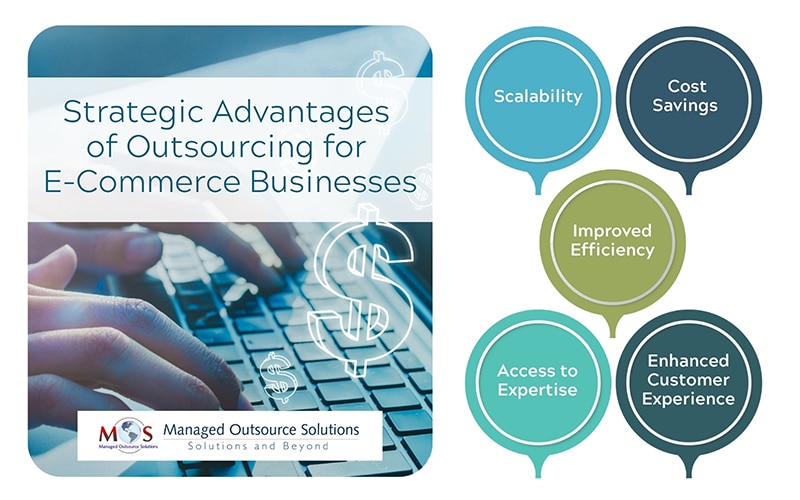The e-commerce market is experiencing robust growth, and is projected to reach USD 83.26 trillion by 2030, according to Grand View Research. In today’s competitive e-commerce landscape, meeting and exceeding customer expectations in speed, accuracy, and service is vital for success. For e-commerce brands, leveraging business process outsourcing (BPO) services is a strategic way to stay competitive in a fast-paced digital landscape. With e-commerce BPO support, online retailers can streamline operations and focus on what truly drives growth – product development, marketing, and delivering exceptional customer experiences.
Both Amazon and Flipkart heavily rely on a wide network of BPO and 3PL (Third-Party Logistics) providers to manage their massive global operations. These partnerships help them scale customer service operations with multilingual support, meet high volume seasonal demand fluctuations, and manage returns, replacements, and reverse logistics, and provide real-time order updates and issue resolution.
This post explores why e-commerce businesses need BPO support at every stage of the customer journey – from click to delivery.
Streamline your e-commerce operations
Partner with a trusted BPO provider today.
What is E-commerce BPO?
E-commerce BPO refers to the practice of delegating specific tasks or functions related to running an online store to a third-party service provider. Instead of hiring an in-house team to handle these operations, e-commerce businesses partner with BPO firms that specialize in delivering customized solutions for various tasks. By outsourcing specific non-core but essential business functions to specialized service providers, e-commerce businesses can stay agile, improve efficiency, reduce costs, and manage demand fluctuations.
E-commerce BPO can include both front-office tasks (directly interacting with customers) and back-office tasks (internal operations). BPO companies offer a wide range of services specifically tailored to e-commerce businesses.
Common examples of BPO services for online stores are:
| Customer service | Managing customer inquiries, handling complaints and returns, providing technical support, and managing live chat or email support. |
| Order processing and fulfillment | Processing orders, verifying payments, managing inventory, picking and packing products, shipping orders, and handling returns. |
| Product information management | Product data entry and updates, catalog management, and image editing and optimization for product listing. |
| Data management | Data cleansing and migration, customer database management, analytics and performance tracking. |
| IT and technical support | Website maintenance and support, shopping cart integration and troubleshooting, and CRM and eCommerce platform support. |
| Back-office support | Invoice processing, refund and payment reconciliation, human resources support. |
| Digital marketing | Managing social media, creating content, assisting with SEO and paid advertising, and analyzing market trends and customer data. |
By outsourcing such tasks, online retailers can focus on their core competencies, such as product development, marketing, and sales, while the BPO partner manages the outsourced functions efficiently.
Why E-commerce Businesses should Outsource Back-Office Operations
Online businesses face the challenge of expanding into new markets, attracting a wider customer base, optimizing their sales processes, and delivering a more personalized customer experience. Voice-activated features are increasingly being integrated into eCommerce platforms, further enhancing the convenience and interactivity of the online shopping experience. At the same time, the rise of mobile commerce presents new challenges, requiring businesses to optimize applications and websites for seamless performance across a diverse array of mobile devices.
Outsourcing offers many strategic advantages for e-commerce businesses:
Scalability
Managing seasonal demand spikes without compromising service quality is a major challenge for e-commerce businesses. BPO solutions support scalable eCommerce operations by helping fast and accurate order processing allowing online stores to easily handle seasonal peaks and growth. By handling essential tasks such as order processing, inventory management, and customer support, BPO enhances e-commerce efficiency. Outsourcing provides scalable, flexible solutions that enable your business to grow without operational bottlenecks, adapting smoothly to changing market demands.
Cost Savings
Effective cost management is essential for sustainable growth. Partnering with an eCommerce BPO helps reduce operational expenses by minimizing the need for in-house hiring, training, infrastructure, and other overhead costs. In fact, studies show that outsourcing can lower costs by as much as 88%.
For example, a garment retailer that outsources its customer support and order processing to a BPO provider can handle seasonal demand surges without expanding its in-house team. This reduces labor and infrastructure costs significantly, helping to increase ROI while still managing huge order volumes seamlessly.
Improved Efficiency
Outsourcing enables faster processing and response times. For example, order fulfillment outsourcing allows e-commerce businesses to streamline one of the most resource-intensive parts of the customer journey—picking, packing, shipping, and handling returns. By partnering with a provider specialized in this field, businesses can reduce delivery times, minimize errors, and ensure smooth operations even during high-demand periods.
Access to Expertise
BPO providers have specialized knowledge and expertise in various e-commerce functions, ensuring tasks are executed with speed, accuracy, and consistency. Tech-driven BPOs go a step further by leveraging advanced tools like AI and analytics to uncover insights into customer behavior, buying patterns, and sales trends. With this data, online retailers can make smarter decisions—optimizing pricing, tailoring promotions, and managing inventory more effectively—to boost conversions, increase average order value, and drive overall sales growth.
Enhanced Customer Experience
BPO services improve customer satisfaction in online retail by providing fast, reliable support across channels – resolving issues like order tracking, returns, and refunds efficiently. With trained agents and 24/7 availability, customers receive timely assistance, leading to a better overall experience. This consistent support helps build trust, strengthens brand loyalty, and reduces customer churn.
With the right e-commerce BPO support, online businesses can increase operational efficiency, enhance the customer experience, and scale efficiently without compromising quality.
eCommerce Back Office Support Services for Online Stores
Let’s take look at how online retailers can make the most of outsourcing.
Best Practices for Outsourcing eCommerce Support Services
To fully experience the benefits of outsourcing, e-commerce businesses must choose the right BPO partner and manage the project strategically. Here are some best practices to ensure success:
- Define clear objectives and KPIs: Establish measurable goals such as order accuracy, response times, and customer satisfaction rates. Clear KPIs help align expectations and monitor the BPO partner’s performance effectively.
- Choose a specialized e-commerce BPO partner: Select a provider with proven experience in e-commerce operations—particularly in areas like customer service, order fulfillment, and product catalog management.
- Ensure seamless integration: Ensure that the BPO partner can integrate easily with your existing platforms and tools.
- Prioritize data security and compliance: Protecting customer data is critical. Make sure the provider adheres to strict data protection protocols and industry compliance standards.
- Test the provider’s capabilities: Start off with a small-scale project to test the provider’s capabilities. Reliable BPO companies offer a free trial that allows you to experience their services before you sign up.
- Maintain open communication: Ensure regular performance reviews and feedback to keep communication transparent and proactive.
- Invest in training: Ensure that the team is familiar with brand guidelines, product details, and FAQs to ensure they deliver consistent, high-quality service aligned with your brand.
- Monitor performance continuously: Use analytics and regular reporting to track outcomes and modify the strategy as needed for continuous improvement.
With the right e-commerce BPO support and a structured approach to outsourcing, online businesses can enhance efficiency, improve customer satisfaction, and scale with confidence – from click to delivery.





